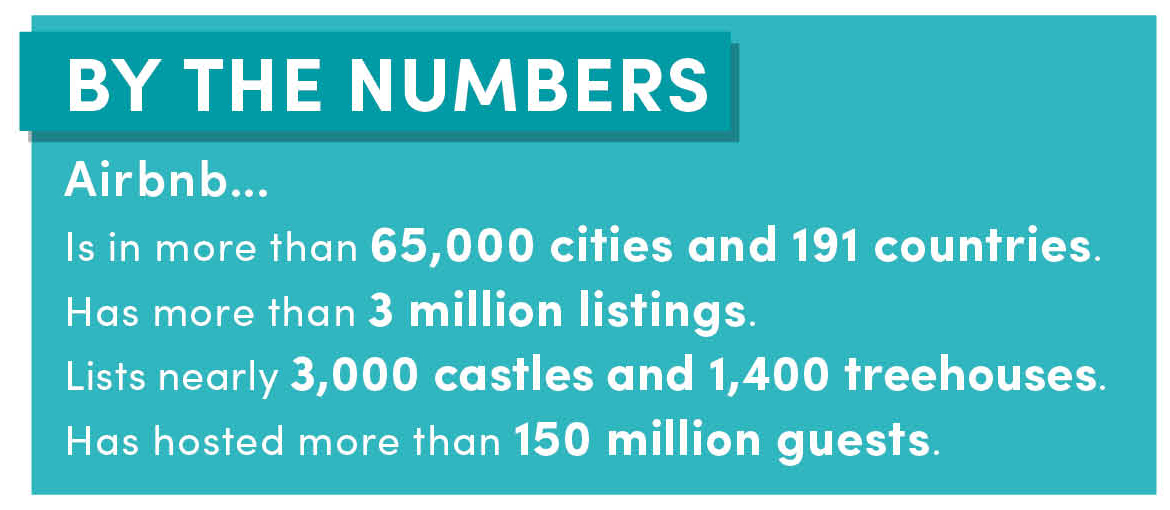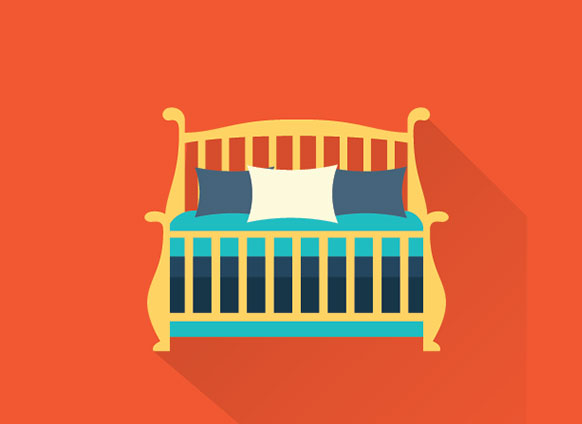I am half-asleep, exhausted from cleaning, painting and rearranging furniture when it occurs to me that in the past three days I’ve put more effort into preparing our guest room to be guest-ready than I have in 10 years of living here. For the amount of work that it’s taking, you’d think we were about to host royalty. But no, it’s all an effort to make the room appeal to complete strangers. I’m readying this spare bedroom so I can join the millions of people who have made extra cash by renting out a room or an entire house. I’m also joining the millions of people who make up the YouEconomy and make extra income through gigs, freelance work or their own business.
Along with being disabused of the notion that this would be easy money, I’ve learned that the approval of a person I’ve never met and whom I will never see again after his stay has been a stronger motivator to improve the room’s appearance and functionality than my family’s comfort over the course of a decade. Until now the room in question has, in theory, been a combination guest bedroom, home office, home gym and music practice room. But it was more like a 10-by-20-foot storage closet. Workout equipment and musical instruments were scattered about, awaiting someone to spontaneously decide to revisit an abandoned health regimen or hobby.
Yet now with the dust wiped off, the home gym might once again beckon someone to do a few reps. And the drum kit, which my son had given up on after growing bored with music lessons a couple of years ago, appears full of potential now that its toppled cymbal stands and throne are back in place.
The next day, I sign up for Airbnb and work on the listing. There are a few basic questions to categorize the space: whether it’s a shared or private room or an entire house; whether it’s wheelchair-accessible; and whether I plan to socialize with guests or give them space. The more detailed questions make me appreciate how much of an innkeeper’s work I’d never noticed or appreciated. Do I have a safety card mapping out escape routes in case of fire? Do I have a fire extinguisher? A first aid kit?
Airbnb then calculates suggested rates based on location, type of space available, number of beds (or air mattresses), events or conventions in town and other factors. My rates were pitifully low. After Airbnb takes its 3 percent, I could be making less than $30 on a weeknight. I decide to go rogue with my rates, select which days I will open the house to guests and wait.
The YouEconomy has made the barrier for entry so low that any of us can become business owners in seconds.
After a couple of hours without a bite, I panic and lower the rate back to the suggested rates of around $27 a night. Within minutes, I receive a reservation for a two-night stay beginning the next night. A new panic sets in.

Airbnb guests and hosts alike have ratings and recommendations from other users. Our first confirmed guest, someone named Timo with a profile photo showing a smiling young man in a passenger plane, has the highest possible rating, five stars, with a dozen comments from past hosts about how quiet, clean and friendly he is. I scour his past stays. His profile says he lives in Commerce, Texas, about an hour from Dallas, where I live, and all of his stays are in Dallas. There is no apparent pattern to what part of the city he stays in or when. I wonder whether he will case my home for valuables, if he exists at all, or if his profile is a bot working some kind of scam. I go down a rabbit hole researching hosts who’ve given him glowing reviews, searching their other posts for evidence that they might be bots, too, even looking up names on social media to confirm they are real people. They all check out. If this is some kind of scam, it’s a sophisticated one. I’ve always had a grudging admiration for a good con artist, so I decide to wait and see how it plays out. We send my teenagers to stay with their mother for the first night, just in case.

Timo and I use the service’s messaging system, which allows us to communicate by text without sharing phone numbers, and he says to expect him between 6 and 7 p.m. The next night, my wife and I stay in and do some last-ditch cleaning, then sit down to watch TV and wait. When 8:30 p.m. rolls around and he still hasn’t shown up, my wife theorizes that the first planned visit is some kind of test and that nobody is going to come. Then the sound of a car pulling in front of the house sets our three dogs into a barking frenzy.
I open the door and extend a hand to Timo, who wears a hairnet and a work shirt embroidered with his name. He smiles as I apologize and try to wrestle the dogs away while they take turns jumping onto him and nudging their noses into his pants. “It’s good, it’s good,” he says with a laugh in a lilting British-sounding accent that I guess to be Kenyan because it reminds me of how marathoners sound in interviews.
He tells me he lives in Commerce but has a new job in Dallas at the Mary Kay factory. He has been staying in various areas getting to know the city before moving and committing to a neighborhood. I show him his room and bathroom. The drum kit is still set up. He shakes his head and smiles, saying, “No, it’s good, it’s good,” when I offer to move it. Timo (pronounced Tim-o) tells me he’ll be out of the house by 6 a.m. and says hopefully it will be a good stay. He likes using Airbnb to “help out regular folk” rather than paying more money for a generic hotel room. We invite him to join us for a drink downstairs, but it’s pretty clear he wants nothing more than the Wi-Fi password and a clean bed.
The second night of Timo’s stay, I’m comfortable enough to have the kids in the house again. We cook spicy Cajun-style chicken with green beans and twice-baked potatoes. Timo arrives right as the meal is ready, so I invite him to eat with us. He seems to ponder the offer for a minute, considering the clamshell box of takeout in his hand.
“You know? I will save this food and join your family for dinner. Thank you, this is a nice offer. It’s good, it’s good. May I put this in the refrigerator?”
He turns down our offer of a beer but says he “will drink Dr Pepper, like a Texan.” Over the meal, we ask what he thinks about Dallas, what neighborhoods he has liked so far, how he ended up in Commerce and where he was from. He is indeed from Kenya, from a rural part of the country. Our curiosity about his homeland—what his family ate for meals (vegetables and bread made from corn), the biggest cultural differences and his biggest surprise when he moved to America (the ubiquity of cars)—dominates the conversation. Timo tells us people from his village walk everywhere and most never venture more than 10 miles from where they’re born.
Timo asks the kids about their studies, interests and hobbies. He is impressed with pictures of my daughter’s illustrations and jewelry, and he perks up when my son talks about the science and engineering charter high school he attends. It turns out Timo works in automation, servicing assembly robots, and he encourages my son to consider the burgeoning field.
Eventually we realize we’ve kept Timo an hour past when he went to bed the previous night, and we say goodnight. The next day, an email prompts me to write a review of his stay. I go upstairs to see that the only evidence anyone had stayed there at all is a damp towel neatly folded on the workout bench. I write a glowing recommendation, and his five-star rating remains unblemished. In turn, he gives me five stars and writes a kind public review and private feedback.

During our dinner the previous night, Timo had gushed evangelically about his experience with Airbnb. He was such a believer that he gave us a thumbnail history of how the company founders—in need of extra money—created a website to rent out air mattresses in their apartment with the promise of a home-cooked meal in the morning, which is where the original name AirBed & Breakfast came from. The co-founders, Brian Chesky, Joe Gebbia and Nathan Blecharczyk, started the business in 2008 and have disrupted the hotel industry ever since. This morning I see where his devotion came from. Preparing the room was hard work, but we were rewarded with an interesting conversation that expanded our world just a little bit and about $50 in the bank to boot. I was able to make money without even leaving my home and with resources I already had—a spare bedroom. On top of that, it doesn’t affect my day job, which means it’s all supplemental income. This is money that can go toward saving for a vacation, the down payment on a new car or splurging on something I normally wouldn’t buy.
Related: ‘The YouEconomy Has Provided Everything I Need to Create the Life I Want’
Like any work or business, not every day is such a delight. Our next stay, a few days later, deflates our enthusiasm. After a little social media investigation following the reservation, I find the renter is a young man from Chennai, India, who went to school in Houston. He tells me he and a young lady will be in town to meet acquaintances. They message and ask when is the earliest they can check in on Saturday. When I throw out a time, 1 p.m., they ask whether they can arrive two hours earlier. Sure, I say.
When the two arrive that weekend, they brush off my attempts to show them around. They ask for the Wi-Fi password and jog up the stairs carrying overnight bags, a paper grocery sack and a gallon of drinking water. The door clicked shut and it was hours before we saw either of them again. That afternoon I set out to pick up a few groceries, leaving my wife alone at the house. I haven’t even reached the corner when my phone rings.
“Oh my gosh, Jesse,” my wife whispers. “They’re… well, you know.” Seconds after I’d shut the front door behind me, creaking and thumping sounds had filled the house. Fortunately, the kids weren’t around.
Looking back over my Airbnb message history, I see the guest never did say when they were meeting their friends, and my assumption that they’d be going out Saturday night was unfounded.
The next morning, I don’t bother with reviewing this guest, nor he with me.
After three nights of guests, we about broke even after taking into account the cost of new sheets and other improvements. De-cluttering, repainting and tidying the space was far more rewarding than a grand total of $82. It might be a coincidence, but my son asked to resume drum lessons not long after the guest room/office/music room was uncluttered enough to walk through without risking tetanus. Having strangers over was an interesting experience but too much of a disruption to make it financially worthwhile. Looking over pricing on other local listings, it’s clear our house isn’t close enough to downtown or any cultural districts to be desirable for tourists, and it’s on the opposite side of the city from the northern ’burbs where traveling workers would most likely be needed.
The sharing aspect of the YouEconomy works like any other economy—on supply and demand.
The sharing aspect of the YouEconomy works like any other economy—on supply and demand. If we’re ever gone for a few days or more, I’d consider renting out the entire house in the future. A whole house fetches considerably more than renting a single room.

The really enlightening part of the experience, apart from seeing the good and bad in people, was the realization that the potential for entrepreneurship is all around us now, thanks to technology. The YouEconomy has made the barrier for entry so low that any of us can become business owners in seconds.
I enjoyed the opportunity to make some extra cash, but next time I’d probably choose another side hustle in the YouEconomy. Maybe driving for Lyft. To do that, though, I’d have to deep-clean my car, as the interior is barely fit for human use. It would need new brake pads, too, and whatever repair a check-engine light indicates. And a couple of tires are getting pretty bald. Also, it needs—you know, maybe I should drive for Lyft after all. If I’m not going to fix my car for my own sake, I could at least fix it for someone else’s.
Related: Sick of Your Day Job? Looking for Freedom? The Answer Is the YouEconomy
This article originally appeared in the May 2017 issue of SUCCESS magazine.

